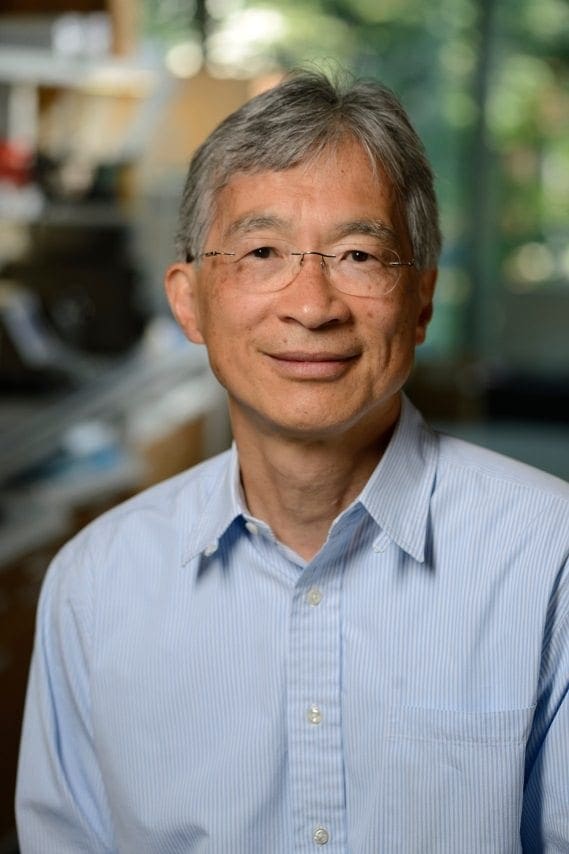
Carl Wu
Bloomberg Distinguished Professor
Contact Information
- [email protected]
- 387 UTL
- 410-516-7496
Research Interests: Eukaryotic chromatin structure and function. Biochemistry of nucleosome remodeling and gene transcription, and live cell-single molecule imaging of histone and nuclear protein dynamics
Carl Wu joined Johns Hopkins University in 2016 as Bloomberg Distinguished Professor with appointments in the Department of Biology, and the Department of Molecular Biology and Genetics. He received his Ph.D. in Biology at Harvard University and did post-doctoral work as a Harvard Junior Fellow. He was a Principal Investigator at the National Cancer Institute for 30 years, and a member of the Transcription Imaging Consortium at HHMI-Janelia (2012 - 2016). He is a member of the US National Academy of Sciences, National Academy of Medicine, American Academy of Arts and Sciences, Academia Sinica, and the European Molecular Biology Organization.
Carl Wu Laboratory
Research Interests
We study how regulatory DNA in the compacted genome is programmed to be open or closed at the earliest stages of transcriptional control, and how chromatin accessibility can be reprogrammed for therapeutic benefit.
Research
Genomes are packaged in chromatin as arrays of nucleosomes that obstruct access to DNA-encoded information, necessitating recruitment of multi-component chromatin remodeling and modification enzymes (CRMs) to create open chromatin at regulatory DNA elements genome-wide. CRMs and sequence-specific transcription factors (TFs) operate synergistically to direct common and cell type-specific transcription programs at all stages of cellular growth, homeostasis and differentiation. Not surprisingly, mutations in the corresponding genes cause a wide range of human disorders and disease.
Our laboratory studies how CRMs and TFs collaborate to generate nucleosome-free DNA, using single-molecule imaging in vitro and in living cells to measure the specificity and affinity of molecular interactions on chromatin, capture transient intermediates and define order of reaction events. In addition, we study the governing network of protein-protein interactions, and how the nucleosome-free window is functionally utilized by key chromatin regulators and the RNA polymerase machinery to effectuate transcription, often under the control of highly remote enhancer elements. We also investigate the poised nucleosome architecture harboring the conserved histone H2A.Z variant around accessible promoters and enhancers, whose deposition by SWR1/SRCAP complexes is being elucidated using structural biology and biophysics.
These strategies are being applied to biomedically important human genes responsible for environmental sensing, cancer, and neurological disorders. With increasing knowledge of fundamental mechanisms, we aim to develop small molecule lead compounds that can reprogram chromatin with precision and restore transcriptional equilibrium in developmental disorders and disease.
Publications
2024
Louder RK, et al. Molecular basis of global promoter sensing and nucleosome capture by the SWR1 chromatin remodeler. Cell 187(24):6849-64. PMID: 39357520 PMCID PMC11606799 (2024).
Ling YH, et al. Disordered C-terminal domain drives spatiotemporal confinement of RNAPII to enhance search for chromatin targets. Nat Cell Biol. PMID: 38548891, PMCID: PMC11210292 (2024).
Kim JM, Carcamo CC, et al. Dynamic 1D search and processive nucleosome translocations by RSC and ISW2 chromatin remodelers. Elife. 12:RP91433. PMID: 38497611 PMCID: PMC10948146 (2024).
2023
Li X, Tang X, et al. GAGA-associated factor fosters loop formation in the Drosophila genome. Mol Cell. S1097-2765(23)00168-5. PMID: 37003261 PMCID: PMC10396332 (2023).
2022
Carcamo CC, et al. ATP binding facilitates target search of SWR1 chromatin remodeler by promoting one-dimensional diffusion on DNA. Elife. PMID: 35876491 PMCID: PMC9365391 (2022).
Poyton MF, Feng XA et al. Coordinated DNA and Histone Dynamics Drive Accurate Histone H2A.Z Exchange. Science Advances 8 (10). PMID 35263135; PMCID: PMC8906749 (2022).
Tang X, et al. Kinetic Principles Underlying Pioneer Function of GAGA Transcription Factor in Live Cells. Nat Struct Mol Biol, 29: 665-676 PMID: 35835866 PMCID: PMC10177624 (2022).